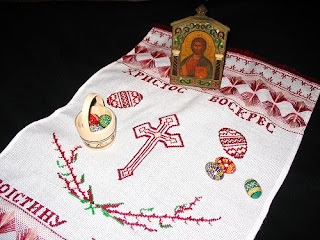 A Ukrainian Orthodox Easter: христос воскрес (Christ is Risen) and symbols of the holiday embroidered on a traditional basket covering, with an icon of Christ and colored eggs in a basket.
A Ukrainian Orthodox Easter: христос воскрес (Christ is Risen) and symbols of the holiday embroidered on a traditional basket covering, with an icon of Christ and colored eggs in a basket. I prepared little Easter baskets for my grandchildren. I put in some candy and sweets, stuffed animals for the little ones, small presents for the older kids. We celebrate Easter, but for me it is more a secular than a religious holiday. A celebration of rebirth and hope. For my daughters Elissa, who is Catholic, and Michelle, a protestant, it is a sacred holiday celebrating the resurrection of Jesus Christ, who died for our sins, was reborn, and promised heaven to all those who believed in him.
Last year at this time I was helping Luba with her Easter preparations, along with her son Sergei, watching her bake Paska, the cylander-shaped Easter bread decorated with white frosting, dying eggs bright red, and a filling a straw basket to take to the monastery to be blessed by the priest.
My contribution was simple. I bought some pysanky, those colorful and elaborately decorated eggs that are an ancient Ukrainian tradition, passed on from mothers to daughters over the generations. I dutifully added a few pysansky eggs to Luba’s Easter basket. Most women today are too busy to decorate the eggs this way, but they are available at the bazaars. I also bought a bunch of (plastic) pure white lilies to decorate my room, then gifted them to Luba. Sergei drove us to the monastery in his ancient but still going white BMW. We marched in with a procession of people, at 5:00 am. The priest dipped a branch of pussy willow into a bucket of water and, walking slowly, wordlessly, along the procession of believers, sprayed us thoroughly with it. We chanted “Христос Воскрес.” That was it. No service, sermons, prayers, Bible readings, choirs. I could see Luba felt satisfied, purified. We later had a gala meal with Luba’s whole family and some friends, with abundant food, grand toasts, and singing. A joyous Easter. It was the last time Sergei would be present for an Easter meal.
Most of all, for Luba, Easter marks the time when she can return to her garden (огород), start digging up the earth, preparing it for planting. She spends hours in her лгород, in the early mornings, after work, all weekends. “You are working too hard,” I would tease her. She'd give me a big smile and say "Я люблю его.” Working in her garden breathed life into her. Last year, at this time, was the last time she would find joy in her garden.
Luba was in her garden on a Saturday, in the strawberry patch, a week after Easter, happy as a lark, fully engaged, when she got the call that changed her life forever.
I heard a blood-curdling scream, a scream of terror and disbelief, as if she had been stabbed with a knife through her heart. I ran out to her. She was frantic, running hither and thither, like a scared rabbit caught in a lair, screaming into the phone, falling to the ground, getting up, falling, in shock. I ran to a neighbor for help, and a few minutes later, thank god, her son Vitaly came and got her up and into a chair. From time to time he sprayed cold water into her face, got her pills to calm her, called friends to come over. It was a horrible day, the day Luba’s painful crying began, and it has not stopped. I didn’t understand what it could be, everything in Russian. A car accident, a death? I couldn’t understand, and didn’t for a long time. But that’s the day Luba learned that her beloved son Sergei had committed a terrible crime and was in jail. That’s when the nightmare of a son in jail began, and the prospects for his freedom grew dimmer and dimmer. That’s when the life and the light went out of Luba. It is still gone.
Now, for Luba, Easter and the return to her garden marks the time Sergei’s life in freedom ended, and tragedy befell the family. Darkness descended. Will some joy return for Luba with the passage of time? Will it be better after a few Easters have gone by? Will there be acceptance, forgiveness, redemption?
I hope so. It is my Easter wish. I pray that on some Easter in the future, Luba will find peace again, and that she will rejoice in her garden and in the blessings of springtime’s rebrith and promise.




No comments:
Post a Comment